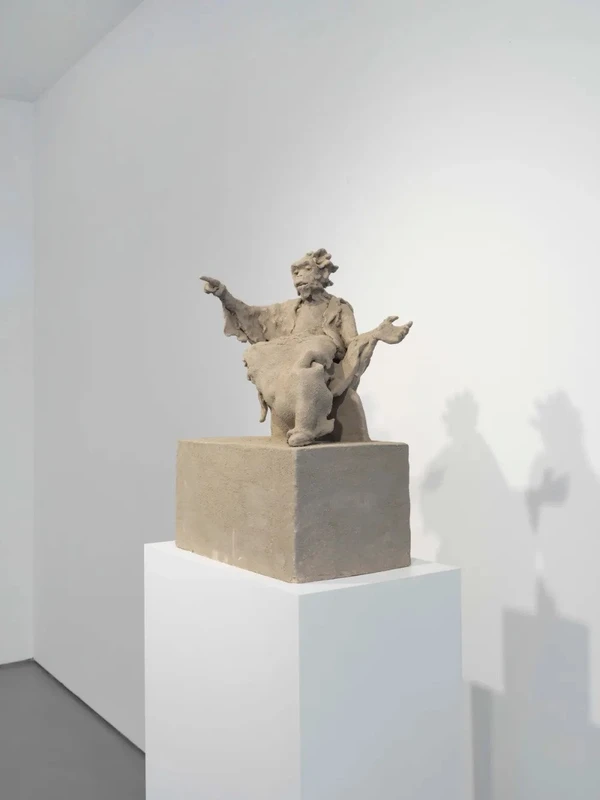Benedetto Pietromarchi: Abyss
31 Aug-30 Sep 2023


“We may brave human laws, but we cannot resist natural ones.”
― Jules Verne, 20,000 Leagues Under the Sea
Presenting his fifth exhibition at Josh Lilley, Benedetto Pietromarchi stages an encounter of other-worldliness, filled with uncanny creatures that emerge at the thresholds of imagination. Crafting sci-fi-esque, anthropomorphic beings from the raw, earthly material of clay; Pietromarchi draws an unwavering line between our desire for autocracy and hegemony, and our inherent tie to nature. Set amongst the wild, intrepid expanses of the sea, Pietromarchi’s cast of gods and monsters contend with nature’s fiercest force and take the viewer into a space of the deep unknown, or unknowable.
A story in two parts, Pietromarchi charts an evolution, examining both the origins and the consequences of human intervention in nature. On one hand, we see octopus and jellyfish – the most cerebral and ancient sea creatures, attached to disembodied vase-like vessels laid dormant on the sea bed. However, just as with Captain Nemo’s first encounter at the ocean floor, these animals, like their flora counter-parts, do not “ask their hosts for sustenance, just a point of purchase” owing their existence only to the “water that sustains and nourishes them”. Perched atop these foreign objects, Pietromarchi sets a scene of first contact, placing the sway of power still in the hands of nature, over its mechanical interloper. In these diametric energies of organic and defunct matter, Pietromarchi also echoes the cycles of life and death, suggesting the presence of sacredity. In 1960, French oceanographer, filmmaker and author Jacques Cousteau described a shipwreck as a site where the “mixture of life and death is mysterious, even religious. There is the same sense of peace and mood that you feel on entering a cathedral.” It is this evocation which resonates through Pietromarchi’s work, reflecting on the unresolved and contradictory relationship between nature, humanity and the divine.
As time elapses, we see new creatures emerge, this time taking on a simian form. A reminder of our own ancestral roots, these monkey-like beings ride the waves, as Neptune in the stories of antiquity. Their agile, rambunctious bodies belie their primitive instincts, as they flail and flounder amidst the spray. Across their faces, a strange mix of irreverence and anguish, petrified in their argil state. Although suspended in playful oblivion, we are reminded of the legend of Faust, a pact whereby the price of sovereignty over nature is a perpetual suffering.
Through a unique interplay between material and matter, Pietromarchi conjures a dystopic realm that epitomises both the precarity and the power of nature. As one walks amongst the fragile, and yet vigorous sculptures, we are reminded of this paradox; our drive for control, but ultimate subservience to the earth. And as the world wages battles of wildfires and water, it is a story not far from anyone’s mind.
Benedetto Pietromarchi (b. 1972, Rome, Italy) lives and works in Rome. Pietromarchi studied at the Accademia delle Belle Arti de Carrara, Italy in 1998. Previous solo exhibitions include Heaven on Mars, Galeria Christopher Paschall, Bogota, Colombia, 2014; Slosh, Josh Lilley, London, 2013; and Carrozza, Flora Fairbairn Projects, London, 2007. Selected group exhibitions include Kaleidoscope, Saatchi Gallery, London, 2019; ITaliens, Italian Embassy, Berlin, 2013; A Change of Heart, The University of Leicester’s Sculpture Garden, 2013, A Broken Fall, Josh Lilley, London, 2009 and A Heart of Glass, Shoreditch Town Hall, London, 2008. Pietromarchi completed the Owner’s Cabin Residency, July 2015, and was awarded the Kenneth Armitage Foundation Fellowship, 2009–2011.